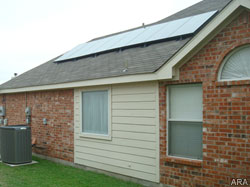
(ARA) – The average retail price of electricity for American homeowners has increased nearly 40 percent in the last 10 years, according to the U.S. Department of Energy, costing homeowners hundreds of dollars on utility bills.
“With energy costs rising right along with demand for electricity, more and more homeowners are looking for ways to save and are seeking out alternative energy sources like solar energy to help cut utility bills,” says Victor Gonzalez-Maertens, a home cooling expert with Lennox, a leading manufacturer of home heating and cooling products.
While installing a complete residential solar energy system can be cost-prohibitive for many homeowners, recent technology that integrates solar power with individual household appliances is making it easier for homeowners to harness the power of the sun without breaking the bank.
Solar-powered heating and air conditioning
One example is the first-of-its-kind SunSource Home Energy System, which was introduced by Lennox this year. It’s a solar-powered central heating and cooling system that reduces overall household electricity consumption without the costs associated with traditional solar installations.
“More than half of a home’s energy costs go toward heating and cooling the home, so if you can use a high-efficiency air conditioner and solar energy to help offset those costs, you can make a substantial dent in your overall utility bill,” says Gonzalez-Maertens.
The SunSource system is based on a high-efficiency air conditioner or heat pump that is solar-ready, which means a homeowner can add solar modules to create a solar energy system, if and when they want one. Gonzalez-Maertens says the homeowner will be able to reduce the energy demand of their home just with the high-efficiency equipment, but will be able to save even more when they add the solar component.
When the solar component is activated, the system harnesses solar energy from the sun to reduce the electricity consumed by the unit. It also uses that solar power to operate other devices in the home that consume electricity, such as lighting and appliances, when the heating and cooling system is not running. In addition, if the SunSource system generates more power than is used by the home, that power will be sent back to the utility company, which may entitle the homeowner to a credit on their utility bill.
Solar water heating
Americans also spend more than $13 billion a year on energy for household water heating, which accounts for almost a quarter of the total energy used in a single-family home. Solar water heating systems, which feature water storage tanks and solar collectors, offer the biggest potential savings to homeowners, as they can save between 50 and 80 percent on water heating bills.
In addition to solar water heaters for the home, many homeowners are turning to solar swimming pool heaters that can save money, extend the swimming season and give the owner more control over water temperature.
Outdoor solar lighting
Another potential area where homeowners can save with solar is on landscape lighting. Home improvement stores now sell outdoor solar lighting systems that are easy to install and operate at no cost because they essentially provide free electricity.
These systems use solar cells, which convert sunlight into electricity. The electricity is then stored in batteries that power the lights at night. Some solar lighting systems are self-contained units, and only need to be placed in a sunny location. Others have the lights separate from a solar cell panel. In this case, only the panel needs to be placed in a sunny location.
According to Gonzalez-Maertens, these recent advances toward integrating solar energy into household appliances are making it easier than ever for homeowners to take advantage of renewable solar energy in an affordable manner. For more information about new energy-saving technology, visit www.Lennox.com or www.ItPaystoLiveSmart.com.
Courtesy of ARAcontent





